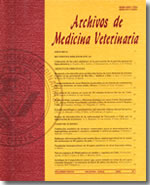A homogeneous fluorescence polarization assay for detection of Clostridium perfringenstype D epsilon antitoxin in serum of goats
Main Article Content
Abstract
A fluorescence polarization assay (FPA) was developed to detect Clostridium perfringens type D epsilon antitoxin in serum of goats. Purified epsilon toxin was labelled with fluorescein isothiocyanate and used as a tracer in the test. Seven goat sera with different known concentrations of epsilon antitoxin (as measured by a mouse neutralization test-MNT) were used as positive controls. Sera from eleven colostrum-deprived kids were used as negative controls. The inter-assay variation of ten measurements of the seven positive sera varied between 1.56% and 4.85%. The correlation between the FPA values and concentration of epsilon antitoxin (as measured by the MNT) was 0.90. This test appears to be a good alternative to the MNT without most of the inconveniences of the later.

